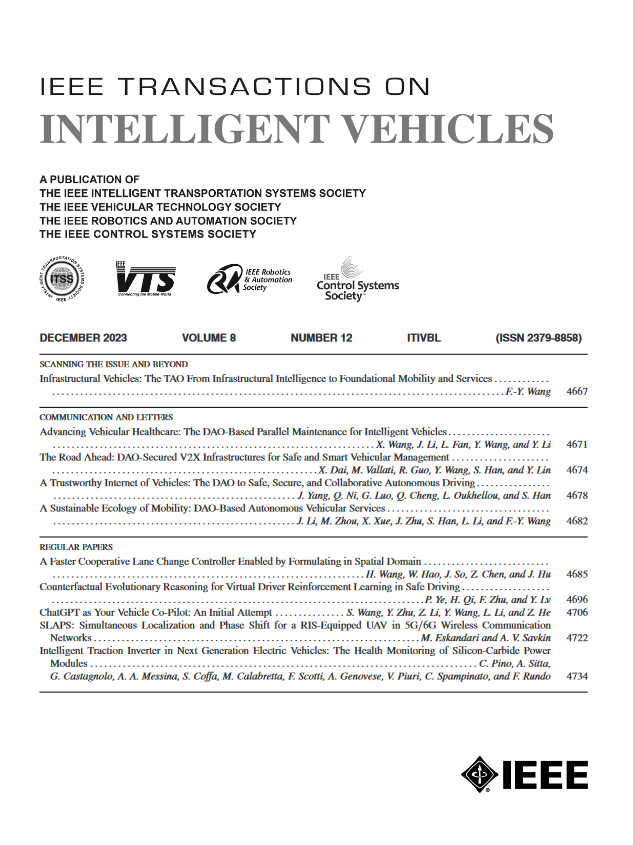Learning Expert-Level Racing Strategies via Scheduled Cost Functions in Model Predictive Control
IF 14.3
1区 工程技术
Q1 COMPUTER SCIENCE, ARTIFICIAL INTELLIGENCE
引用次数: 0
Abstract
In racing sports, driving strategies necessitate meticulous control and optimal utilization of vehicle dynamics. Model predictive control (MPC) has emerged as an effective approach for imitating expert driving strategies. Traditional MPC methods typically rely on constant cost functions, which are not optimal in dynamic environments that require track-dependent strategies. This paper introduces a novel framework that enhances the imitation of expert strategies by incorporating a scheduled cost function into the MPC. We present an inverse model predictive control (iMPC) framework, equipped with a custom MPC formulation that adeptly integrates scheduled cost functions. By employing Gaussian process (GP) regression, our framework effectively maps the connection between trajectories and their respective scheduling costs, enabling dynamic adaptation of cost functions within MPC planning. Furthermore, we present a probabilistic modeling method that combines Bayesian optimization (BO) with GP. This method is designed to create datasets that closely mimic expert-level driving behaviors, enriching the data available for training and validating our iMPC approach. We evaluate our framework by emphasizing the goodness of fit and interpretability of the reconstructed cost functions and the resulting trajectories. Compared to standard imitation learning methods, our approach stands out in its ability to accurately restore trajectories. We validate our framework using human-in-the-loop expert data and demonstrate the superiority of our methodology by comparing it with a tracking MPC.模型预测控制中利用计划成本函数学习专家级竞赛策略
在赛车运动中,驾驶策略需要对车辆动力学进行细致的控制和优化利用。模型预测控制(MPC)是一种模仿专家驾驶策略的有效方法。传统的MPC方法通常依赖于恒定的成本函数,这在需要轨迹依赖策略的动态环境中不是最优的。本文介绍了一个新的框架,通过在MPC中加入计划成本函数来增强专家策略的模仿。我们提出了一个逆模型预测控制(iMPC)框架,配备了一个定制的MPC公式,熟练地集成了计划成本函数。通过采用高斯过程(GP)回归,我们的框架有效地映射了轨迹与各自调度成本之间的联系,从而在MPC规划中实现了成本函数的动态适应。在此基础上,提出了一种结合贝叶斯优化和GP的概率建模方法。该方法旨在创建模拟专家级驾驶行为的数据集,丰富可用于训练和验证我们的iMPC方法的数据。我们通过强调拟合的优度和重构成本函数的可解释性以及由此产生的轨迹来评估我们的框架。与标准的模仿学习方法相比,我们的方法在准确恢复轨迹的能力方面脱颖而出。我们使用人在循环专家数据验证了我们的框架,并通过将其与跟踪MPC进行比较来证明我们方法的优越性。
本文章由计算机程序翻译,如有差异,请以英文原文为准。
求助全文
约1分钟内获得全文
求助全文
来源期刊

IEEE Transactions on Intelligent Vehicles
Mathematics-Control and Optimization
CiteScore
12.10
自引率
13.40%
发文量
177
期刊介绍:
The IEEE Transactions on Intelligent Vehicles (T-IV) is a premier platform for publishing peer-reviewed articles that present innovative research concepts, application results, significant theoretical findings, and application case studies in the field of intelligent vehicles. With a particular emphasis on automated vehicles within roadway environments, T-IV aims to raise awareness of pressing research and application challenges.
Our focus is on providing critical information to the intelligent vehicle community, serving as a dissemination vehicle for IEEE ITS Society members and others interested in learning about the state-of-the-art developments and progress in research and applications related to intelligent vehicles. Join us in advancing knowledge and innovation in this dynamic field.
 求助内容:
求助内容: 应助结果提醒方式:
应助结果提醒方式:


